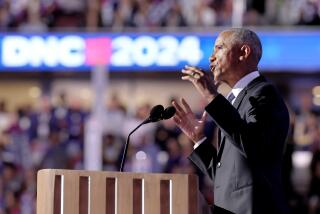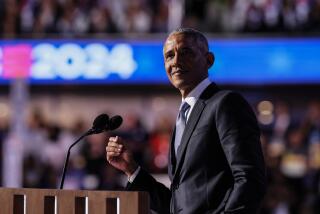Obama versus who? President making John Boehner a foil
WASHINGTON — John Boehner is hardly a household name, but President Obama seems set on making him one.
Obama gave Boehner a major cameo in his speech outside Cleveland on Wednesday, seeking to create a useful foil for his argument that Congress should remain under Democratic control. As House Republican leader, Boehner once summarized his approach to the Obama agenda in two words: “Hell, no!”
“You need a device if you’re going to have a debate, because you can’t have a debate against a vacuum,” a senior White House aide said in an interview Thursday, speaking on the condition of anonymity to discuss the administration’s thinking. “Boehner provided an opportunity for that. At previous times over the course of the last year, [Senate Republican leader Mitch] McConnell has served that purpose and [Texas House Republican Joe] Barton has been a foil.”
But to mount an effective attack on Boehner, the White House must first introduce him to voters who, for the most part, have no idea who he is. A CNN poll released the day of Obama’s speech showed 55% either have never heard of Boehner or have no opinion about him.
Ten times in the course of the Cleveland address, Obama invoked Boehner’s name or title. Later, in a televised interview with ABC’s George Stephanopoulos, Obama said that Boehner’s aim is to become House speaker, displacing Democrat Nancy Pelosi of California and restoring Republican policy goals.
“I think it’s very important that the American people understand what the Republicans are offering, which is essentially more of the same,” Obama said. “I mean, we have seen what their policies have done.”
White House aides have posted blog items criticizing Boehner’s ideas for economic recovery. Obama spokesman Robert Gibbs has mocked Boehner from the podium in his daily briefings. The president even teased Boehner about his so-called perma-tan at the annual White House correspondents dinner.
It’s not clear any of this is working.
Privately, Boehner aides said they’re pleased that despite the gusts of criticism from the West Wing, the minority leader remains comparatively anonymous. They said they’re also a bit baffled that the White House is tracking the congressman’s itinerary.
Obama deliberately chose the Cleveland area because it’s the same city Boehner visited last month for a speech that denounced Obama’s economic policies.
“Think about the whole idea,” Boehner spokesman Kevin Smith said in an interview. “A sitting president of the United States followed Boehner to Cleveland to respond to a speech the minority leader of the U.S. House of Representatives gave. That’s pretty amazing.”
Republicans contend that by elevating Boehner, Obama diminishes his presidency.
Mark McKinnon, who was an advisor to former President George W. Bush, said: “I don’t think most Americans have a clue who John Boehner is and wonder why the president is lowering himself to attacking a congressman.”
Republicans said the strategy is futile. Democrats need to win independent voters, who’ve largely soured on Obama’s agenda. Some of these voters may see Boehner’s steadfast opposition not as blind obstructionism, but as a principled stance. A new Quinnipiac poll shows that independents disapprove of Obama 52%-38%.
“The independents don’t know who Boehner is, and when you say, ‘He’s the guy opposing my plan,’ they like that,” said Grover Norquist, president of the conservative Americans for Tax Reform. “A majority of independents want someone to say ‘no’ to all of Obama’s spending.”
Boehner, elected to the House from his Ohio district in 1990, rose to the No. 4 leadership position under then-Speaker Newt Gingrich in 1994. He rarely made national headlines until becoming Republican House leader in 2006. If the GOP regains control of the House and he is elected Speaker, he has promised that his No. 1 priority would be to “repeal Obamacare,” the healthcare overhaul that is the administration’s centerpiece legislative accomplishment. His legislative career includes bipartisan work with the late Sen. Edward M. Kennedy (D-Mass.) on the “No Child Left Behind” education measure in 2002.
If Republicans are skeptical of the White House strategy, Democrats said they’re thrilled. Personalizing the issue and singling out Boehner rallies the Democratic base, they said.
Boehner exemplifies what Democrats see as an implacable “party of no,” going so far in an emotional House floor debate on healthcare earlier this year as to denounce overhaul legislation by shouting “hell no!”
By targeting Boehner, Obama provides some needed political cover for the Democratic House Speaker, Nancy Pelosi of San Francisco.
Pelosi has been a focus of the anti-incumbent fervor driving the campaign season. To the extent Obama can show that Boehner is a flawed alternative to Pelosi, he helps shore up her position and increase the odds that Boehner doesn’t supplant her as Speaker.
In a meeting with Obama senior advisor David Axelrod and others in April, Democratic House members urged the White House to adopt the sharp, aggressive tone now coming from the president, congressional aides said.
Asked about the speech Obama delivered, one House Democratic aide said: “If you polled most Democratic staffers, they would say: ‘It’s about time.’ It was one of the best speeches he’s given in a long time. It’s essentially the stuff we’ve been saying about Boehner for the last six months. But the president has the biggest microphone in town and has the ability to define the argument better than anyone.”
peter.nicholas@latimes.com
More to Read
Get the L.A. Times Politics newsletter
Deeply reported insights into legislation, politics and policy from Sacramento, Washington and beyond. In your inbox three times per week.
You may occasionally receive promotional content from the Los Angeles Times.










